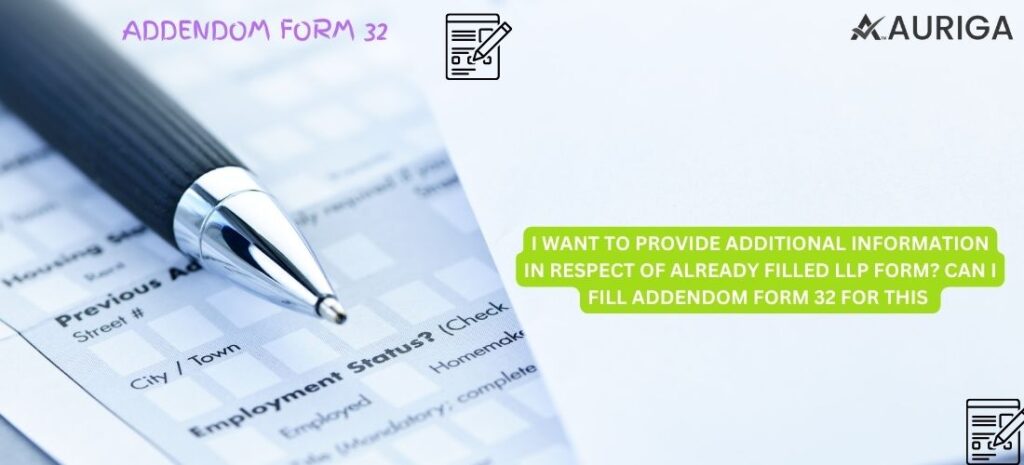
I WANT TO PROVIDE ADDITIONAL INFORMATION IN RESPECT OF ALREADY FILLED LLP FORM? CAN I FILL ADDENDOM FORM 32 FOR THIS
Introduction
ToggleI WANT TO PROVIDE ADDITIONAL INFORMATION IN RESPECT OF ALREADY FILLED LLP FORM? CAN I FILL ADDENDOM FORM 32 FOR THIS
Addendum Form 32“ for providing additional information or making amendments to already filed LLP forms. However, the process for making amendments or providing additional information to previously filed LLP forms typically involves filing a revised or corrected version of the original form, along with the updated information. Visitofficialwebsite
WHICH FORMS REQUIRED TO PROVIDE ADDITION INFORMATION IN RESPECT OF ALREADY FILLED LLP FORM
Form 3 – Information with regard to Limited Liability Partnership Agreement and changes, if any, made therein: Use this form if you need to make changes to the LLP Agreement, such as changes in capital contributions, profit-sharing ratios, or other terms and conditions of the agreement.
Form 4 – Notice of Appointment of Partner/Designated Partner or cessation of partner/designated partner or changing in particulars of partners/designated partners: Use this form if there are changes in the partners of the LLP, including the appointment or cessation of partners, or changes in the particulars of existing partners or designated partners.
Form 11 – Annual Return of Limited Liability Partnership (LLP): Use this form if you need to update information in the LLP’s annual return, such as changes in the registered office address, details of partners, and other annual compliance-related information.
Form 1 – Application for reservation or change of name: Use this form if you need to amend or update the name of the LLP.
WHAT IS FORM 1
Form 1 in the context of Limited Liability Partnerships (LLPs) in India is officially known as “Form 1 – Application for reservation or change of name.” This form is used to apply for the reservation of a name for an LLP or to request a change in the name of an existing LLP.
Here are the key purposes and details related to Form 1:
Reservation of Name: If you are in the process of incorporating a new LLP, you can use Form 1 to apply for the reservation of a unique name for the LLP. The name reservation is an essential step in the LLP registration process.
Change of Name: If an existing LLP wishes to change its name for any reason, it can also use Form 1 to request a change of name. This might be done for various reasons, including rebranding or a change in the LLP’s business focus.
Unique Name: The name applied for or changed to in Form 1 must be unique and should not be identical or too similar to the names of other LLPs or companies already registered in India. The Registrar of Companies (RoC) will review the name for availability.
Digital Signature: Form 1 must be digitally signed by a designated partner of the LLP using their Digital Signature Certificate (DSC).
Attachments: Depending on the nature of the name reservation or change request, Form 1 may require attachments or annexures that provide additional details and supporting documentation.
WHAT IS FORM 3
Form 3 in the context of Limited Liability Partnerships (LLPs) in India is officially known as “Form 3 – Information with regard to Limited Liability Partnership Agreement and changes, if any, made therein.” This form is used to provide information about the LLP Agreement and any changes made to it.
Here are some key points about Form 3:
Purpose: Form 3 is used to inform the Registrar of Companies (RoC) about the details of the LLP Agreement. The LLP Agreement contains the terms and conditions agreed upon by the partners of the LLP, including their rights, duties, profit-sharing ratios, and other important provisions.
Submission: LLPs are required to file Form 3 with the RoC at the time of LLP registration. Additionally, if there are any changes to the LLP Agreement, such as amendments or modifications, Form 3 should be used to inform the RoC about these changes.
Changes in LLP Agreement: If there are any changes in the LLP Agreement, including changes in partners’ roles, capital contributions, profit-sharing ratios, or any other terms, those changes should be reported through Form 3.
Filing Deadline: Form 3 is typically filed within 30 days of the effective date of the changes to the LLP Agreement.
Digital Signature: The form must be signed electronically using the Digital Signature Certificate (DSC) of a designated partner.
WHAT IS FORM 4
Form 4 in the context of Limited Liability Partnerships (LLPs) in India is officially known as “Form 4 – Notice of Appointment of Partner/Designated Partner or cessation of partner/designated partner or changing in particulars of partners/designated partners.” This form is used to report changes related to partners or designated partners within an LLP.
Here are the key purposes and details related to Form 4:
Purpose: Form 4 is used to inform the Registrar of Companies (RoC) about various changes related to partners and designated partners of the LLP. These changes may include the appointment or cessation of partners, changes in the particulars of partners or designated partners, and other relevant updates.
Types of Changes Reported:
- Appointment of Partner: If a new partner is appointed in the LLP, the details of the newly appointed partner are reported through Form 4.
- Cessation of Partner: If a partner leaves or ceases to be a partner in the LLP, this change is reported using Form 4.
- Changes in Particulars: If there are changes in the particulars of existing partners or designated partners, such as their addresses or contact information, these changes are reported.
- Changes in Designation: If there are changes in the designation of partners (e.g., from a regular partner to a designated partner), these changes are reported as well.
Filing Deadline: LLPs are typically required to file Form 4 within 30 days of the effective date of the changes in partner or designated partner details.
Digital Signature: Form 4 must be signed electronically using the Digital Signature Certificate (DSC) of a designated partner.
Attachments: Depending on the nature of the changes being reported, Form 4 may require attachments or annexures that provide additional details and supporting documentation.
WHAT IS FORM 11
Form 11 in the context of Limited Liability Partnerships (LLPs) in India is officially known as “Form 11 – Annual Return of Limited Liability Partnership (LLP).” This form is used to file the annual return of an LLP, providing essential information about the LLP’s activities and compliance status.
Here are the key points about Form 11:
Purpose: Form 11 is filed annually by LLPs to provide detailed information about the LLP’s activities and financial status. It serves as an annual compliance requirement.
Annual Reporting: LLPs are required to file Form 11 each year with the Registrar of Companies (RoC). This form summarizes the LLP’s activities and financial details for the preceding financial year.
Information Included: The form typically includes information about the LLP’s partners, the state of the registered office, the financial status, and other relevant details. It may also include details about the LLP’s capital structure, business activities, and any changes that occurred during the year.
Filing Deadline: Form 11 is due within 60 days from the closure of the financial year. LLPs need to ensure they file it on time to meet their annual compliance obligations.
Digital Signature: The form must be digitally signed by designated partners of the LLP using their Digital Signature Certificates (DSCs).
How many resubmissions are allowed in run LLP
The Designated Partner Identification Number (DPIN) is a unique identification number assigned to each designated partner of a Limited Liability Partnership (LLP) in India. If you need to obtain a DPIN for an existing LLP, here are the steps to follow:
Eligibility:
- Ensure that you meet the eligibility criteria for becoming a designated partner as per the Limited Liability Partnership Act, 2008.
Application Form:
- Obtain Form DIR-3, which is the application form for allotment of Director Identification Number (DIN)/DPIN. This form can be downloaded from the official website of the Ministry of Corporate Affairs (MCA) in India.
Fill Out the Form:
- Complete the Form DIR-3 with accurate and relevant details. Provide information such as your full name, date of birth, address, educational qualifications, occupation, etc.
Attach Documents:
- Attach the necessary documents, such as a photograph, proof of identity, proof of address, and any other required documents, as specified in the form.
Notarization and Apostille:
- Depending on your location and the requirements, you may need to notarize or apostille certain documents before submission. Ensure compliance with the specific guidelines provided in the form.
Payment of Fee:
- Pay the prescribed fee for the DPIN application. The fee can be paid online through the MCA portal.
Submit the Form:
- Submit the completed Form DIR-3 along with the necessary documents and payment to the Ministry of Corporate Affairs. You can submit the form online through the MCA portal.
Approval and Allotment:
- Once the application is processed and approved, the Ministry of Corporate Affairs will allot a DPIN to the designated partner.
Update LLP Agreement:
- After obtaining the DPIN, update the LLP agreement to reflect the details of the new designated partner.
It’s important to note that the process and requirements may be subject to change, and it’s advisable to check the latest guidelines on the official MCA website or consult with a professional, such as a company secretary or legal advisor, for the most accurate and up-to-date information.
How many resubmissions are allowed in run LLP
There is no specific information available regarding the number of resubmissions allowed in the context of running an LLP (Limited Liability Partnership). However, I can provide some general information based on common practices related to LLP compliance and filings in India.
When filing documents or forms with the Registrar of Companies (RoC) for an LLP, it’s essential to ensure that the submissions are accurate and comply with the applicable rules and regulations. If there are errors or discrepancies in the filings, the RoC may raise objections or request additional information.
In such cases, the LLP typically has an opportunity to rectify the issues and resubmit the corrected documents. The number of resubmissions allowed may depend on the nature of the objections and the specific rules or guidelines set by the RoC.
To get the most accurate and up-to-date information on resubmissions and LLP compliance, it is recommended to refer to the latest provisions of the Limited Liability Partnership Act, 2008, and any relevant notifications or guidelines issued by the Ministry of Corporate Affairs (MCA) in India. Additionally, consulting with a professional, such as a company secretary or legal advisor, can provide specific guidance tailored to your situation and the current regulatory landscape.
How do I amend an LLP agreement
Amending a Limited Liability Partnership (LLP) agreement in India involves a structured process outlined by the Limited Liability Partnership Act, 2008. Here are the general steps you can follow:
Review the Existing Agreement:
- Carefully review the existing LLP agreement to identify the specific clauses or provisions that need to be amended. This could include changes in partners, profit-sharing ratios, business activities, or any other relevant details.
Convene a Meeting:
- Convene a meeting of the partners to discuss and obtain their consensus on the proposed amendments. A notice should be sent to all partners, specifying the date, time, and agenda of the meeting.
Pass a Resolution:
- During the meeting, pass a resolution approving the proposed amendments to the LLP agreement. The resolution should be approved by the partners holding the required majority as per the terms of the existing agreement or the LLP Act.
Draft Amendment Agreement:
- Based on the approved resolution, draft the amendment agreement incorporating the proposed changes. Ensure that the changes are clearly and accurately reflected in the document.
Execution of Amendment Agreement:
- All partners need to sign the amendment agreement to signify their acceptance of the changes. Each partner should retain a copy of the amended agreement for their records.
Filing with the Registrar of Companies (RoC):
- File the duly signed and executed amendment agreement with the Registrar of Companies (RoC) within 30 days of the date of the amendment. The filing is typically done online through the LLP portal.
Payment of Fees:
- Pay the prescribed fees for filing the amendment with the RoC. The fees are based on the capital contribution and any additional fees applicable as per the LLP rules.
Obtain Approval from Partners:
- After filing with the RoC, obtain approval from all the partners for the amended agreement.
Update Records:
- Update the LLP’s records, including the LLP agreement, and maintain a copy of the amended agreement at the registered office of the LLP.
It’s important to note that the specific process and documentation may vary, and it’s advisable to consult with a professional, such as a company secretary or legal advisor, to ensure compliance with the LLP Act and regulations. Additionally, the LLP agreement should always be in accordance with the latest legal requirements.

5 benefits of limited liability
A Limited Liability Partnership (LLP) is a popular business structure that combines elements of a traditional partnership with the limited liability protection typically associated with companies. Here are five benefits of forming an LLP:
Limited Liability:
- One of the primary advantages of an LLP is that the liability of each partner is limited to their agreed contribution to the LLP. This means that the personal assets of individual partners are generally protected from the business debts and liabilities of the LLP. This limited liability feature provides a level of financial security for the partners.
Flexibility in Management:
- LLPs offer flexibility in terms of management structure. Partners have the freedom to organize and manage the business as they see fit, with minimal regulatory requirements compared to companies. There is no requirement for a board of directors, and partners can actively participate in the day-to-day operations of the business.
Tax Advantages:
- LLPs enjoy certain tax advantages. Profits are taxed at the personal income tax rates of the partners, avoiding the double taxation that can occur in the case of companies. Additionally, LLPs are not subject to the dividend distribution tax.
Ease of Formation and Compliance:
- The process of forming an LLP is relatively straightforward, and the compliance requirements are less burdensome compared to companies. LLPs are subject to fewer regulations, making them an attractive option for smaller businesses and professional service providers.
Continuity and Perpetual Succession:
- An LLP has perpetual succession, meaning that the existence of the LLP is not affected by changes in the partners. The death, retirement, or departure of a partner does not result in the dissolution of the LLP. This feature ensures continuity in the business, providing stability and longevity.
It’s important to note that while LLPs offer various benefits, the suitability of this business structure depends on the specific needs and goals of the business. Additionally, legal and regulatory frameworks may evolve, so it’s advisable to seek professional advice when considering the formation of an LLP.
How do I resubmit an LLP run form
- 2.1.2.1 Option 1.
- STEP 1: Access MCA homepage.
- STEP 2: Login to MCA portal with valid credentials.
- STEP 3: Access application history through user dashboard.
- STEP 4: Select RUN LLP application with status as ‘Resubmission required’
- STEP 5: Fill up the application.
- STEP 6: Search CIN/LLPIN using the search option (optional)2.
HOW AURIGA ACCOUNTING HELP YOU TO PROVIDE ADDITIONAL INFORMATION IN RESPECT OF ALREADY FILLED LLP FORM
Assessment and Compliance Check: Auriga Accounting can assess your specific situation and the nature of the changes or additional information you need to provide. They will conduct a compliance check to ensure that the changes comply with current regulations and guidelines.
Correct Form Selection: Auriga Accounting assist you in selecting the correct form or forms required for the changes you want to make. This is essential to ensure that you are using the appropriate forms as per the latest regulations.
Documentation and Information Gathering: Auriga Accounting can help you gather the necessary documentation and information required for the amendments or additions. This may include details about partners, designated partners, the LLP Agreement, financial statements, or any other relevant documents.
Form Filling and Completion: Auriga Accounting can assist in accurately filling out the selected forms, including providing the updated or additional information. They will ensure that the forms are completed correctly and in compliance with regulatory requirements.
Digital Signature Assistance: Auriga Accounting can guide you in obtaining or renewing Digital Signature Certificates (DSCs) for designated partners and assist in digitally signing the forms, as this is a mandatory requirement.
Submission and Follow-Up: Auriga Accounting can submit the forms on your behalf through the official portal of the Ministry of Corporate Affairs (MCA) or the relevant regulatory authority. If there are any issues or requests for additional information from the authorities, Auriga Accounting can assist in addressing them and following up to expedite the process.
Compliance Tracking: Auriga Accounting can help you track the status of your submissions and ensure that the amended or additional information is processed and approved in a timely manner.
Record-Keeping: Auriga Accounting can maintain organized records of all filings, including the Service Request Numbers (SRNs), for your compliance and record-keeping purposes.
Compliance Guidance: Auriga Accounting can provide guidance on ongoing compliance requirements to ensure that your LLP remains in good standing with regulatory authorities.
Professional Expertise: Auriga Accounting’s expertise in regulatory compliance and financial matters ensures that the process is handled efficiently and accurately.












